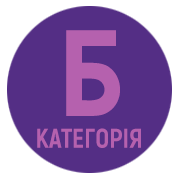COMPETENT APPROACH TO THE IMPLEMENTATION OF METHODS OF TRAINING FUTURE SPECIALISTS OF SPECIAL EDUCATION
DOI:
https://doi.org/10.32782/inclusion/2025.5.8Keywords:
special education, training of specialists, competence approach, innovative technologies, teaching methods, correctional teachersAbstract
The social significance of the professional activity of special education specialists determines the high requirements for their competence. Correctional teachers provide not only education and upbringing of children with special educational needs, but also correction of their development; cooperate with children’s families, doctors, rehabilitators, and other specialists. The fundamental principle of training specialists in special education should be a competency-based approach with clear compliance with Higher Education Standards, professional Standards, and Qualification Characteristics of Specialists. This approach assumes the unity of the personal, cognitive, and operational components of readiness of future specialists to perform professional activities. The article highlights the possibilities of ensuring the unity of these components in the practice of implementing technologies and methods of training future correctional teachers; it is shown how their choice is determined by the goals, tasks, content and features of the educational discipline. It is advisable to use problem-based methods based on activity and cooperation; brainstorming promotes the ability to consciously transfer theoretical knowledge into professional practice; Business games and modeling of professional situations are quite important interactive technologies. Brain-rings, round tables allow to increase the interest of education seekers in classes, make the process of consolidating knowledge informal and contribute to the development of soft skills. The analysis of pedagogical tasks contributes to the formation of an algorithm of actions to solve difficult situations/problems in future professional activities. Implementation of the competence approach as a leading principle of modern higher education through teaching technologies and methods provides a combination of theory, practice and professional motivation; contributes to the formation of consciousness and cognitive activity of students of higher education, their independence, creativity, flexibility, parity interaction with teachers.
References
Дубасенюк О., Антонова О. Методика викладання педагогіки : курс лекцій. 2 вид., доп. Житомир : Вид-во ЖДУ ім. І. Франка, 2017. 327 с.
Інноваційні технології навчання в умовах модернізації сучасної освіти : монографія / за наук. ред. Л. Ребухи. Тернопіль : ЗУНУ, 2022. 143 с.
Миронова С., Чопік О. Методика викладання фахових дисциплін спеціальності Спеціальна освіта : навчальний посібник ; Кам’янець-Подільський національний університет імені Івана Огієнка. 2025. 132 с.
Нагаєв В., Портян М. Методика викладання у вищій школі : навчальний посібник. 2 вид., перероб. і доп. Харків : Стильна типографія, 2018. 289 с.
Савченко В., Андрюшина Л. Традиційні та інноваційні педагогічні технології у вищій школі : навчальний посібник для здобувачів ІІ і ІІІ ступенів вищої освіти. Дніпро : Візіон, 2019. 83 с.







